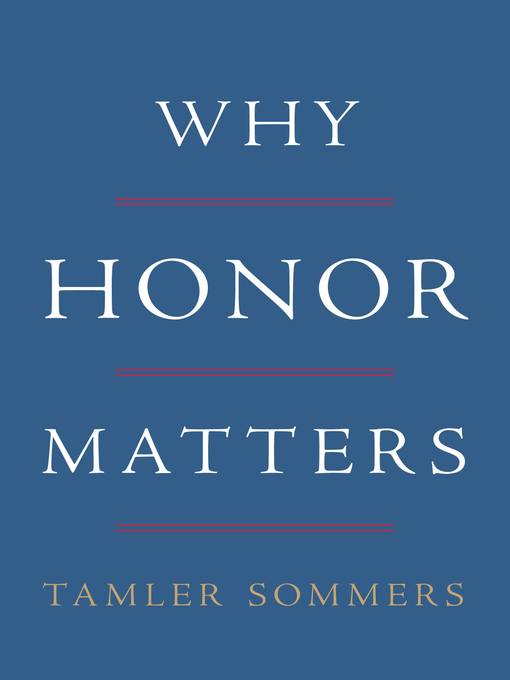
Why Honor Matters
کتاب های مرتبط
- اطلاعات
- نقد و بررسی
- دیدگاه کاربران
نقد و بررسی

February 15, 2018
A philosopher offers an impassioned, but disturbing, defense of honor cultures.In a social critique sure to generate controversy, Sommers (Philosophy/Univ. of Houston; Relative Justice: Cultural Diversity, Free Will, and Moral Responsibility, 2012, etc.) argues that honor cultures offer a better ethical model than "Western liberalism," with its insistence on universal dignity. Honor cultures, characterized by "social cohesion and solidarity"--think sports teams, urban gangs, and Navy SEALS--emphasize "courage, integrity, and accountability" and adherence to a "formal and informal" set of codes. Such cultures "take great pride in their exclusivity." Societies guided by liberal values, writes the author, lead to "diminishing personal accountability, increasing social isolation, alienation and a weakening sense of solidarity and community spirit." Responding to the "common objection" that honor cultures mistreat women, Sommers asserts that honor itself does not require "sexist norms and practices." He acknowledges, however, that honor cultures can inflict "systematic violations of the rights of women," as well as incite "long, bloody" family feuds and "trap individuals within rigid social roles, limiting their autonomy as rational agents." To address these concerns, the author argues that honor cultures require constraints; white working-class Southern men, for example, engage in ritualized, circumscribed violence as a form of "active resistance to the domination of others" and a way of gaining respect. Condemning the "depersonalized, excessively rationalistic" legal system, Sommers argues persuasively that "honorable punishment" can be facilitated through the restorative justice movement, which involves mediated encounters between victims and criminals. The violent protest in Charlottesville, Virginia, in 2017 was for Sommers "an eye-opening event" because he "didn't quite realize the extent" of white nationalists' "abhorrent racist ideology." Neofascists, he admits, "do use rhetoric that isn't too far off from the language I've employed to describe honor communities," and he belatedly acknowledges "the morality of dignity and its focus on equality and respect for human rights."A celebration of insular, exclusionary honor culture that does not adequately account for its pernicious effects.
COPYRIGHT(2018) Kirkus Reviews, ALL RIGHTS RESERVED.

May 15, 2018
Sommers (philosophy, Univ. of Houston; Relative Justice) challenges views dominant in contemporary moral philosophy that emphasize individual dignity and endeavor to arrive at universal principles. To Sommers, these ideas are overly abstract and individualistic, and he asserts that we can learn much from "honor cultures," in which shame rather than guilt motivates people. In these societies, the good of the community is stressed, and the need to preserve one's honor leads people to act with courage. Defying customary philosophical opinion, he finds a positive role for violence and revenge and is well aware that these can easily get out of hand but argues that abstract justice should not sweep them aside entirely. Sommers forcefully advocates the benefits of restorative justice, in which victims and criminals, along with other interested parties, are encouraged to resolve disputes over retributive justice. Appeals to honor have proved useful in a number of programs to reduce gang violence, which are explained in considerable detail. VERDICT Sommers's vivid style and engaging anecdotes will appeal to general readers as well as to those interested in moral and political philosophy. It draws comparison to William Ian Miller's Eye for an Eye.--David Gordon, Ludwig von Mises Inst., Auburn, AL
Copyright 2018 Library Journal, LLC Used with permission.

























دیدگاه کاربران